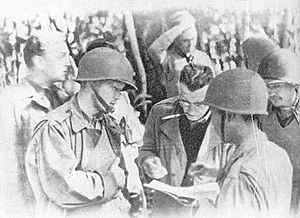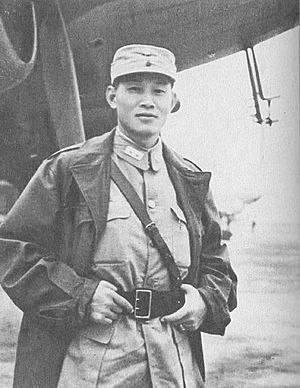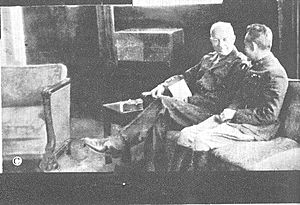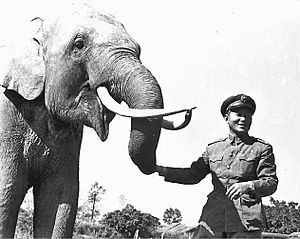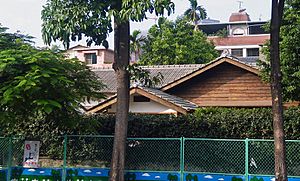Sun Li-jen facts for kids
Quick facts for kids
Sun Li-jen
|
|
|---|---|
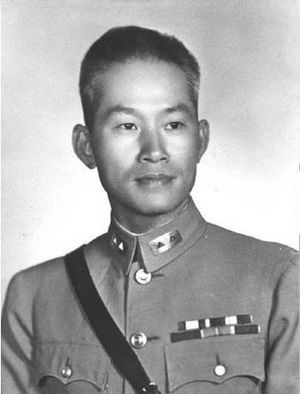
Sun Li-jen
|
|
| Native name |
孫立人
|
| Nickname(s) | "Rommel of the East" |
| Born | December 8, 1900 Jinnu, Lujiang, Chaohu, Anhui, Qing dynasty |
| Died | November 19, 1990 (aged 89) Taichung, Taiwan, Republic of China |
| Allegiance | |
| Service/ |
|
| Years of service | 1927–1955 |
| Rank | |
| Commands held | Tax Police Regiment New 38th Division New First Army Republic of China Army |
| Battles/wars |
|
| Awards |
|
| Other work | Politician |
Sun Li-jen (traditional Chinese: 孫立人; simplified Chinese: 孙立人; pinyin: Sūn Lìrén; December 8, 1900 – November 19, 1990) was a famous Chinese general. He was a graduate of the Virginia Military Institute in the United States. General Sun is remembered for his important leadership during the Second Sino-Japanese War and the Chinese Civil War.
His great military skills earned him the nickname "Rommel of the East". His army, called the New First Army, was known as the "Best Army under heaven." They were very effective against Japanese soldiers in the 1937 Battle of Shanghai and during the Burma Campaign from 1943 to 1944.
Even with his success, General Sun did not always have the full trust of Chiang Kai-shek, the leader of China. After the Chinese Civil War, he was given mostly ceremonial jobs. Later, he was kept at home for many years.
He was also known by other names like Sun Chung-neng and Fu-min.
Contents
Biography
Early Life and Education
Sun Li-jen was born in Jinnu, a town in Anhui province, China. When he was young, he was part of the Scouts and joined a big march in Tiananmen Square in 1919. This event was part of the May Fourth Movement, a time when young people wanted to make China stronger and more modern.
In 1919, he married Gong Xitao. The next year, he started studying civil engineering at Tsinghua University. Sun was also a talented basketball player there. He even led the Chinese team to win a gold medal at the 1921 Far Eastern Championship Games.
In 1923, he received a special scholarship called the Boxer Indemnity Scholarship. This allowed him to go to Purdue University in the United States, where he finished his engineering degree in 1924. After a short internship, Sun decided to change his path. He felt a strong desire to serve his country, which was facing many challenges. He believed he could help China more as a soldier than as an engineer.
So, he applied to the Virginia Military Institute (VMI), a famous military school in the U.S., and graduated from there. In 1927, Sun traveled around Europe and Japan to learn about the latest military strategies. When he returned to China, he joined the National Revolutionary Army. He was later put in charge of the National Salt Gabelle Brigade. He trained these troops so well that they became some of the best-equipped soldiers in China.
Fighting in the Second Sino-Japanese War
General Sun led his soldiers against the Japanese during the Battle of Shanghai in 1937. He was seriously injured by pieces of a mine during this battle. After he recovered, Sun bravely returned to lead his troops.
After two years of training, Sun's New 38th Division was sent to Burma (now Myanmar) by Chiang Kai-shek. Their mission was to protect the Burma Road, a vital supply route. Sun's troops were part of the Chinese Expeditionary Force.
In a famous battle, Sun led his 113th Regiment through tough jungle to rescue 7,000 British soldiers. These British forces were surrounded by many more Japanese soldiers in the Battle of Yenangyaung. For his bravery, King George VI of the United Kingdom honored Sun with the Commander of the British Empire medal.
Even though the Japanese managed to cut off the Burma Road, General Sun earned the respect of General William Slim, a British commander. Sun and his division retreated safely into India.
In 1943, Sun's division became part of the 'X Force'. This was a Chinese army group under the command of Joseph Stilwell, an American general. General Stilwell was very impressed by the discipline of Sun's soldiers. Sun's troops led the way in the Burma Campaign of 1943. This campaign aimed to take back North Burma and reopen a land route to China called the Ledo Road. General Stilwell believed Sun was the most skilled Chinese field commander in the entire war.
In 1945, General Sun was invited by American General Dwight D. Eisenhower to visit battlefields in Europe. After his tour, he returned to China to accept the surrender of Japanese forces in Canton.
Role in the Chinese Civil War
After the war with Japan ended, China did not find peace. A civil war began between the Nationalist government and Communist forces. Sun's New First Army was sent to Manchuria in northeast China.
On May 20, 1946, Sun's troops won an important battle against the Communist People's Liberation Army (PLA) at Siping. This battle lasted for a month. The Communist troops even had a saying: "As long as we don't have to fight the New 1st Army, we are not afraid of the Central Government's million troops." This shows how much they respected Sun's army.
However, Sun faced challenges within his own side. Some other Nationalist generals, especially those trained at the Whampoa Military Academy, did not cooperate well with him. Chiang Kai-shek eventually replaced Sun with another general whom he felt was more loyal. In July 1947, Sun was given a new role in Nanjing, becoming the deputy commander-in-chief of the Army and commanding general of the Army Training Command.
Moving to Taiwan
In 1947, as the civil war continued, Sun moved one of his training facilities to Taiwan. He trained new officers and soldiers for the Nationalist government there. He hoped these new troops could help turn the tide of the war. While his efforts were not enough to change the overall outcome of the civil war, one of the divisions he trained was sent to Quemoy in 1949. They helped defend against a Communist invasion there.
In 1950, Sun was made Commander in Chief of the Republic of China Army in Taiwan. He also commanded the Taiwan Defense Command and the Army Training Command. Americans respected Sun very much. There were even rumors that the CIA wanted Sun to replace Chiang Kai-shek as leader. This made Chiang and his son, Chiang Ching-kuo, worried about Sun's power.
In June 1954, Sun was given a new role as a ceremonial chief military adviser to Chiang Kai-shek. This meant he could no longer directly control any troops. In 1955, Sun was officially removed from his duties and kept at home. He remained under house arrest for more than 30 years.
He was finally released on March 20, 1988, shortly after Chiang Ching-kuo passed away. General Sun Li-jen died in his home in Taichung at the age of 89. His funeral was held with full military honors, attended by top military leaders.
In 2001, after a government investigation, General Sun's reputation was officially cleared. In January 2011, President Ma Ying-jeou formally apologized to Sun Li-jen's family. Sun's former house in Taichung was then opened as a memorial hall and museum, honoring his life and contributions.
Family
General Sun had two sons, Sun Tien-ping and Sun An-ping, and two daughters, Sun Chung-ping and Sun Tai-ping. He also had a sister named Sun Pi-jen.
See also
- Chinese Army in India
 In Spanish: Li-jen Sun para niños
In Spanish: Li-jen Sun para niños
 | Anna J. Cooper |
 | Mary McLeod Bethune |
 | Lillie Mae Bradford |


